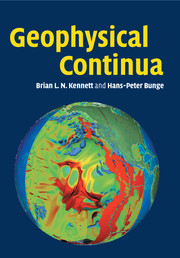Book contents
- Frontmatter
- Contents
- Preface
- 1 Introduction
- PART I CONTINUUM MECHANICS IN GEOPHYSICS
- PART II EARTH DEFORMATION
- 9 From the Atomic Scale to the Continuum
- 10 Geological Deformation
- 11 Seismology and Earth Structure
- 12 Lithospheric Deformation
- 13 The Influence of Rheology: Asthenosphere to the Deep Mantle
- 14 Mantle Convection
- 15 The Core and the Earth's Dynamo
- Appendix: Table of Notation
- Bibliography
- Index
9 - From the Atomic Scale to the Continuum
from PART II - EARTH DEFORMATION
Published online by Cambridge University Press: 17 March 2011
- Frontmatter
- Contents
- Preface
- 1 Introduction
- PART I CONTINUUM MECHANICS IN GEOPHYSICS
- PART II EARTH DEFORMATION
- 9 From the Atomic Scale to the Continuum
- 10 Geological Deformation
- 11 Seismology and Earth Structure
- 12 Lithospheric Deformation
- 13 The Influence of Rheology: Asthenosphere to the Deep Mantle
- 14 Mantle Convection
- 15 The Core and the Earth's Dynamo
- Appendix: Table of Notation
- Bibliography
- Index
Summary
The continuum equations we have encountered in previous chapters make use of the device of a constitutive equation representing the relation between stress and strain at the macroscopic level. Such constitutive equations are therefore the intermediaries by which properties at the atomic level are translated to their implications at much larger length scales. Behaviour at the atomic scale depends on the properties of the constituent crystals, e.g., elastic moduli, and on departures of the material from ideality. Grain boundaries, vacancies, dislocations and other forms of defects play their role in controlling transport properties in the crystals. Such transport phenomena in turn control the way in which composite materials respond to externally imposed forces.
A wide variety of semi-empirical constitutive relation have been devised to represent specific aspects of material behaviour. The variety of functional forms represents the balance between different classes of deformation mechanisms at the atomic level. The net result is a non-linear relation between stress and strain (or strain-rate).
Transport properties and material defects
Grains and crystal defects
The polycrystalline aggregates that make up the Earth's silicate mantle are composed of multiple minerals, each with finite grain size within which there may be further classes of interruption of the regular crystal lattices. The distribution of grain size with depth is therefore a very important, but imperfectly known, property of the mantle.
Information
- Type
- Chapter
- Information
- Geophysical ContinuaDeformation in the Earth's Interior, pp. 153 - 179Publisher: Cambridge University PressPrint publication year: 2008
